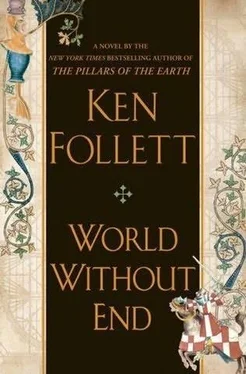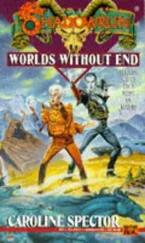Ralph could see that Nate was shocked by the waste, even though the planting was illegal. Peasants never liked to see crops despoiled. Ralph had learned in France that the best way of demoralizing the population was to burn the harvest in the fields.
“That will do,” he said, quickly getting bored. He was irritated by Davey’s insolence in planting this crop, but that was not the main reason he had come to Wigleigh. The truth was that he wanted to see Sam again.
As they rode back to the village he scanned the fields, looking for a tall young man with thick dark hair. Sam would stand out, because of his height, among these stunted serfs hunched over their spades. He saw him, at a distance, in Brookfield. He reined in and peered across the windy landscape at the twenty-two-year-old son he had never known.
Sam and the man he thought was his father – Wulfric – were ploughing with a horse-drawn light plough. Something was wrong, for they kept stopping and adjusting the harness. When they were together it was easy to see the differences between them. Wulfric’s hair was tawny, Sam’s dark; Wulfric was barrel-chested, ox-like, where Sam was broad-shouldered but lean, like a horse; Wulfric’s movements were slow and careful, but Sam was quick and graceful.
It was the oddest feeling to look at a stranger and think: my son. Ralph believed himself immune to womanish emotions. If he had been subject to feelings of compassion or regret he could not have lived as he had. But the discovery of Sam threatened to unman him.
He tore himself away, and cantered back to the village; then he succumbed again to curiosity and sentiment, and sent Nate to find Sam and bring him to the manor house.
He was not sure what he intended to do with the boy: talk to him, tease him, invite him to join them for dinner, or what. He might have foreseen that Gwenda would not leave him free to choose. She showed up with Nate and Sam, and Wulfric and Davey followed them in. “What do you want with my son?” she demanded, speaking to Ralph as if he were an equal rather than her overlord.
Ralph spoke without forethought. “Sam was not born to be a serf tilling the fields.” he said. He saw Alan Fernhill look at him in surprise.
Gwenda looked puzzled. “Only God knows what we are born for,” she said, playing for time.
“When I want to know about God, I’ll ask a priest, not you,” Ralph said to her. “Your son has something of the mettle of a fighting man. I don’t need to pray to see that – it’s obvious to me, as it would be to any veteran of the wars.”
“Weil, he’s not a fighting man, he’s a peasant, and the son of a peasant, and his destiny is to grow crops and raise livestock like his father.”
“Never mind his father.” Ralph remembered what Gwenda had said to him in the sheriff’s castle at Shiring, when she had persuaded him to pardon Sam. “Sam has the killer instinct,” he said. “It’s dangerous in a peasant, but priceless in a soldier.”
Gwenda looked scared as she began to divine Ralph’s purpose. “What are you getting at?”
Ralph realized where this chain of logic was leading him. “Let Sam be useful, rather than dangerous. Let him learn the arts of war.”
“Ridiculous, he’s too old.”
“He’s twenty-two. It’s late, but he’s fit and strong. He can do it.”
“I don’t see how.”
Gwenda was pretending to find practical objections, but he could see through her simulation, and knew that she hated the idea with all her heart. That made him all the more determined. With a smile of triumph he said: “Easily enough. He can be a squire. He can come and live at Earlscastle.”
Gwenda looked as if she had been stabbed. Her eyes closed for a moment, and her olive-skinned face paled. She mouthed the word “No” but no sound came out.
“He’s been with you for twenty-two years,” Ralph said. “That’s long enough.” Now it’s my turn, he thought, but instead he said: “Now he’s a man.”
Because Gwenda was temporarily silent, Wulfric spoke up. “We won’t permit it,” he said. “We are his parents, and we do not consent to this.”
“I didn’t ask for your consent,” Ralph said contemptuously. “I’m your earl, and you are my serfs. I don’t request, I command.”
Nate Reeve put in: “Besides, Sam is over the age of twenty-one, so the decision is his, not his father’s.”
Suddenly they all turned and looked at Sam.
Ralph was not sure what to expect. Becoming a squire was something many young men of all classes dreamed about, but he did not know whether Sam was one of them. Life in the castle was luxurious and exciting, by comparison with breaking your back in the fields; but, on the other hand, men-at-arms died young, or – worse than that – came home crippled, to live the rest of their miserable days begging outside taverns.
However, as soon as Ralph saw Sam’s face he knew the truth. Sam was smiling broadly, and his eyes gleamed with eagerness. He could hardly wait to go.
Gwenda found her voice. “Don’t do it, Sam!” she said. “Don’t be tempted. Don’t let your mother see you blinded by an arrow, or mutilated by the swords of French knights, or crippled by the hooves of their warhorses!”
Wulfric said: “Don’t go, son. Stay in Wigleigh and live a long life.”
Sam began to look doubtful.
Ralph said: “All right, lad. You’ve listened to your mother, and to the peasant father who raised you. But the decision is yours. What will you do? Live out your life here in Wigleigh, tilling the fields alongside your brother? Or escape?”
Sam paused only for a moment. He looked guiltily at Wulfric and Gwenda, then turned to Ralph. “I’ll do it,” he said. “I’ll be a squire, and thank you, my lord!”
“Good lad,” Ralph said.
Gwenda began to cry. Wulfric put his arm around her. Looking up at Ralph, he said: “When shall he go?”
“Today,” Ralph said. “He can ride back to Earlscastle with me and Alan after dinner.”
“Not so soon!” Gwenda cried.
No one took any notice of her.
Ralph said to Sam: “Go home and fetch anything you want to bring with you. Have dinner with your mother. Come back and wait for me in the stables. Meanwhile, Nate can requisition a mount to carry you to Earlscastle.” He turned away, having finished with Sam and his family. “Now, where’s my dinner?”
Wulfric and Gwenda went out with Sam, but Davey stayed behind. Had he already found out that his crop had been trampled? Or was it something else? “What do you want?” Ralph said.
“Lord, I have a boon to ask.”
This was almost too good to be true. The insolent peasant who had planted madder in the woods without permission was now a supplicant. What a satisfying day this was turning out to be. “You can’t be a squire, you’ve got your mother’s build,” Ralph told him, and Alan laughed.
“I want to marry Amabel, the daughter of Annet,” said the young man.
“That won’t please your mother.”
“I will be of age in less than a year.”
Ralph knew all about Annet, of course. He had nearly been hanged for her sake. His history was entwined with hers almost as much as with Gwenda’s. He recalled that all her family had died in the plague. “Annet still has some of the lands her father held.”
“Yes, lord, and she is willing for them to be transferred to me when I marry her daughter.”
Such a request would not normally have been refused, although all lords would charge a tax, called an entry fee, on the transfer. However, there was no obligation on a lord to consent. The right of lords to refuse such requests on a whim, and blight the course of a serf’s life, was one of the peasants’ greatest gripes. But it provided the ruler with a means of discipline that could be extraordinarily effective.
Читать дальше












